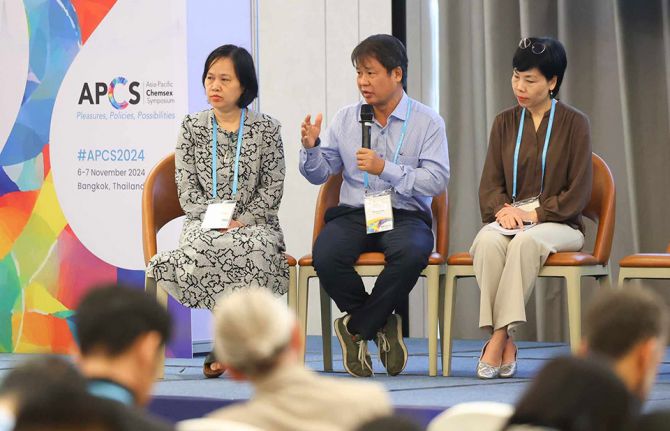
Feature Story
Punitive laws and human rights violations limit access to HIV prevention and care services for men who have sex with men and transgender people in Asia Pacific
21 July 2010
21 July 2010 21 July 2010Vienna, 21 July 2010 – Some 19 of 48 countries in the Asia Pacific region continue to criminalize male-to-male sex, and these laws frequently lead to abuse and human rights violations. Correspondingly, HIV prevalence has reached alarming levels among men who have sex with men and transgender populations in many countries of the region. If countries fail to address the legal and human rights context of HIV, this already critical situation is likely to become worse. The implementation of effective, national HIV responses requires governments to consider and address the effects of laws and law enforcement practices on the health of men who have sex with men and transgender people.
This warning came as a key finding in the report entitled Legal environments, human rights and HIV responses among men who have sex with men and transgender people in Asia and the Pacific: An agenda for action.
Commissioned by the United Nations Development Programme (UNDP) and the Asia Pacific Coalition on Male Sexual Health (APCOM), this report and its key findings were presented during the session on Criminalizing Homosexual Behavior: Human Rights Violation and Obstacles to Effective HIV/AIDS Prevention at the XVIII International AIDS Conference in Vienna.
The study found that a range of laws, such as public order and vagrancy offences, are selectively enforced against men who have sex with men and transgender people in many countries of the region. Even in the absence of criminalization, the arbitrary and inappropriate enforcement of other legal provisions often violate the rights of men who have sex with men and transgender persons, thereby obstructing advocacy, outreach, and delivery of HIV and health services. The issue of effective access to HIV services was at the heart of the 2009 landmark ruling by the Delhi High Court that Section 377 of the Indian Penal Code unfairly discriminates against men who have sex with men.
The existence of punitive laws across the Asia Pacific Region along with selective, discriminatory enforcement practices continues to reduce the effectiveness of national HIV responses. According to Jeff O’Malley, Director of UNDP’s HIV Practice, “repressive legal environments institutionalize discrimination, limit funding and in effect obstruct the participation of men who have sex with men and transgender people in protecting themselves and their families, friends and communities from HIV. In the context of HIV and in the context of human rights, we must continue to vigorously defend and promote rights based HIV, health and development policies and programme responses – this necessitates working to remove punitive laws and discriminatory practices.”
The study highlighted that there are some recent examples of protective laws, judicial and policy actions to improve the legal environment for men who have sex with men and transgender people, including important court judgments in Nepal, India, Pakistan, Philippines, Fiji, South Korea and Hong Kong SAR. However, these are exceptional developments and action is required to improve the legal environment in all countries.
“There is a way forward towards ensuring that all citizens of a country, irrespective of their sexual orientation or gender identity can access health services to prevent unnecessary infection,” said Shivananda Khan, Chair of APCOM. “Developing strategic partnerships and alliances between affected communities, the legal profession, human rights bodies, parliamentarians, policy makers and the media is critical.”
Many national HIV policies now accord a priority to men who have sex with men, even though the legal environment remains repressive. Some 22 national HIV responses in the Asia and Pacific region have identified men who have sex with men as a priority population for the purposes of HIV prevention and four countries have specific strategic plans or action plans on men who have sex with men and HIV (Cambodia, China, Indonesia and India). Furthermore, the Global Fund to Fight AIDS, Tuberculosis and Malaria is funding a regional multi-country programme in South Asia on men who have sex with men and HIV, which has been endorsed by seven South Asian countries.
The report is available for download at: http://regionalcentrebangkok.undp.or.th/practices/hivaids
Right Hand Content
Cosponsors:
Contact:
In Vienna:
Zoran Stevanovic
Bratislava
Regional Communications Advisor UNDP, Europe and the CIS
tel. +421 2 59337 428,
mob. +421 908 729 846
zoran.stevanovic@undp.org
Dr. Mandeep Dhaliwal
New York
Cluster Leader: Human Rights, Gender and Sexual Diversities Cluster, UNDP
tel. +1 646 642 4612
mandeep.dhaliwal@undp.org
In Bangkok:
Edmund Settle
Bangkok
HIV Policy Specialist, Asia Pacific Regional Center UNDP
tel. +66 (0) 818369300
edmund.settle@undp.org
Publications:
UNAIDS Outlook Report 2010 (pdf, 6 Mb)
UNAIDS Outcome Framework 2009-2011 (pdf, 388 Kb)




